- Home
- Patricia Highsmith
A Dog's Ransom
A Dog's Ransom Read online
ADDITIONAL BOOKS BY PATRICIA HIGHSMITH
PUBLISHED BY W. W. NORTON
Nothing That Meets the Eye: The Uncollected Stories of Patricia Highsmith
A Suspension of Mercy
Strangers on a Train
The Blunderer
People Who Knock on the Door
The Glass Cell
Deep Water
This Sweet Sickness
Small g: A Summer Idyll
Little Tales of Misogyny
The Animal-Lover’s Book of Beastly Murder
Slowly, Slowly in the Wind
The Black House
Mermaids on the Golf Course
The Talented Mr. Ripley
Ripley Under Ground
Ripley’s Game
The Boy Who Followed Ripley
Ripley Under Water
The Price of Salt (as Claire Morgan)
ADDITIONAL TITLES FROM OTHER PUBLISHERS
Miranda the Panda Is on the Veranda (with Doris Sanders)
A Game for the Living
The Cry of the Owl
The Two Faces of January
Plotting and Writing Suspense Fiction
Those Who Walk Away
The Tremor of Forgery
The Snail-Watcher and Other Stories
Edith’s Diary
Found in the Street
Tales of Natural and Unnatural Catastrophes
A Dog’s Ransom
Patricia Highsmith
W. W. Norton & Company
New York London
For my father
Jay Bernard Plangman
with affection
Contents
Begin Reading
1
Greta showed Ed the letter as soon as he came in the door. “I couldn’t help opening it, Eddie, because I knew it was from this—that creep.”
The envelope was addressed to Mr. Edward Reynolds, as usual. It was the third letter. Greta had rung him up at the office about it, though she had not wanted to read it over the telephone. The letter, printed with a ball-point pen, said:
DEAR SIR OR “GENTLEMAN”:
I SUPPOSE YOU ARE PRETTY PLEASED WITH YOURSELF? PEOPLE LIKE YOU DISGUST ME AND NOT ONLY ME BUT A HELL OF A LOT OF OTHER PEOPLE IN THIS WORLD. YOU ARE SMUG, YOU ARE SELF-SUFICIANT YOU THINK. SUPERIOR TO EVERYONE ELSE YOU THINK. A FANCY APARTMENT AND A SNOB DOG. YOU ARE A DISGUSTING LITTLE MACHINE, NOTHING ELSE. YOUR DAYS ARE NUMBERED. WHAT RIGHT HAVE YOU GOT TO BE “SUPERIOR”?
ANON (AS IN “SEE YOU ANON” HA!)
“Oh, my God,” Ed said, smiled uncertainly at his wife, and handed the letter and the envelope back to her. Since Greta didn’t extend a hand, he laid them on the top of the baby grand piano on his left. “Hi, Lisa, hello!” Ed said, bending at last to take the front paws of the black French poodle dancing around him.
Greta removed the letter and envelope from the piano, as if they might contaminate the instrument. “You don’t think we should tell the police?”
“No. No, really, darling. And don’t you worry. These people vent themselves—in writing letters, that’s all. They’re irritating, but they can’t really hurt you.” Ed hung up his topcoat, then went into the bathroom to wash his hands. He had just come from the office, and as he let the water rinse away the soap, he thought, I’m washing my hands of the subway and also of that damned letter. Who was writing the letters? Someone who lived in his neighborhood, probably. Ed two weeks ago had asked George, one of the doormen downstairs, if any stranger had asked for his name, if he’d seen anyone odd hanging around, male or female, and George had said no. Ed was sure George had asked the other doormen the same question. Was it someone in his office? Inconceivable, Ed thought. Yet one never knew, did one? A poison-pen letter-writer didn’t necessarily stare at you, wouldn’t be obviously an enemy. On the other hand, Anon’s letters seemed genuinely dim-witted, not like anyone at C. & D., even the clean-up men. The letters annoyed Ed, but they frightened Greta, and Ed didn’t want to show even his annoyance too much, lest it augment her fear. And perhaps he was a little afraid, too. Someone had singled him out to write to. Or was he the only recipient? Were there other people in his neighborhood just as annoyed as he was?
“Want a drink, darling? Lisa can wait a minute,” Greta said.
“All right. I’ll start one. A small one.” Sometimes he took Lisa out as soon as he got home, sometimes after a pre-dinner drink.
Greta went into the kitchen. “A lousy day or a good day?”
“Mixed. Meeting today. Lasted all afternoon.”
Lisa rushed up to Ed with a teasing “Wurf!” because she knew she was due for an airing. She was a miniature poodle, not of the very best kennel, but still a pure poodle, with dark-golden eyes, and she was sensitive and polite—evidently born polite, because neither Ed nor Greta had spent much time training her.
“So? The meeting today?” Greta handed Ed a scotch and water with ice.
“It wasn’t bad. No big arguments.” It had been the monthly Editorial Meeting. Ed knew Greta was troubled by the letter from Anon, and was trying to make this interval between his homecoming and dinner like that of any other evening. Ed worked at Cross and Dickinson on Lexington Avenue and was senior editor in the non-fiction department. He was forty-two and had been with the publishing house for six years. He sat down on the dark-green sofa and patted the pillow once, which was an okay for Lisa who wanted to leap up. “Want me to pick up something?” Ed asked, as he nearly always did.
“Ah, yes, darling, some sour cream. I forgot it. It goes with our dessert.”
There was a delicatessen on Broadway.
“What’s for dinner?”
“Corned beef. You didn’t smell it?” Greta laughed.
Ed had smelled it, and forgot. One of his favorite dishes. “It’s because you didn’t put the cabbage on yet.” He set his drink down and stood up. “Okay, Lisa?”
Lisa leapt off the sofa and scurried around in the foyer, as if looking for her own leash, which hung inside the hall closet door.
“Back in twenty minutes,” Ed said. He started to take his topcoat, and decided not to.
The elevator was self-operating, but there was a doorman below—George tonight, a husky black fellow.
“How you, Lisa?” George said, and bent to pat her, but Lisa was in such a hurry to see the great outdoors, she gave him only a perfunctory salute with front paws raised in a capriole, then strained at her leash to get to the sidewalk.
That evening, Ed envied Lisa’s energy. He felt tired, and vaguely depressed. Lisa went to the right, towards West End and the delicatessen, and paused to crouch and pee in the gutter. Ed considered going to the delicatessen first, then decided to take Lisa to Riverside Park now for her usual run. He went down the stone steps ornamented by the equestrian statue of Franz Sigel, crossed the Drive with the light, and let Lisa off her leash. Dusk was falling quickly. It was just after 7 p.m., and the month was October. Across the Hudson River, a couple of lighted advertisements had come on. This time last year, Ed thought, Margaret had been alive. His daughter, Don’t think any more about that, he told himself. Aged eighteen. What a shame and all that. Oddly the conventional phrases were the most comforting. It was because, he knew, he could not bring himself to think profoundly about her death, her absence, the waste, the shame and all that. That was, if he was even capable of thinking profoundly, about anything. Maybe he wasn’t. Maybe that was why he didn’t try, didn’t dare, to think about his promising daughter who had fallen in with a lot of young crumbs and
died of drugs—no, rather she’d been shot in a brawl. Why had he thought of drugs? She’d been trying drugs, yes, that was true, but the drugs had not killed her. The shot had killed her. In a bar in Greenwich Village. The police had rounded up the boys with the guns, but it had been extremely vague just who fired that particular shot, and in a way it didn’t matter, to Ed. The bar was called The Plastic Arms. Disgusting. Not even a funny joke, that name. They had changed the name since the night of the police raid, the brawl, the shooting.
Ed said in a firm voice, “Lisa, old girl, you’re going to bring something back tonight.”
But he hadn’t brought her blue rubber ball. He didn’t want to throw a stone, which Lisa would have gladly fetched, because stones were bad for her teeth.
“Lisa, dammit, I forgot your ball.”
Lisa looked at him expectantly, and barked. “Throw something!”
Ed picked up a stick, a short thick piece heavy enough to be thrown some distance. Lisa went after it like a shot, and brought it back, teasing him for the first seconds, as if she would not let it go, but at last she put it down, because she wanted it to be thrown again.
Ed threw it. The sour cream, he thought. Mustn’t forget.
“Okay, Lisa!” Ed clapped his hands. He was shouting towards some dark bushes where Lisa had disappeared in quest of the stick. Since the dog didn’t appear, Ed trudged towards the bushes. “Give it up, old girl.” She had no doubt lost the stick and was sniffing around for it.
He didn’t see her. Ed turned around. “Lisa?” He whistled.
There was a zoo-oom of automobile engines as a red light changed to green on Riverside Drive.
“Lisa!”
Ed went up to the street level, and looked on the pavement. But what would Lisa be doing up here? He turned back down the grassy slope, back to the clump of trees and bushes where she had disappeared. “Lisa, come!”
It had grown much darker suddenly.
Ed walked back the way he had come, parallel with the horse statue. “Lisa!”
Had she gone back to the house? Absurd. Still, he crossed the Drive, and ran along the pavement to his door. To George, in the lobby, he said:
“I can’t find Lisa. If she comes back here, can you keep her in the lobby?” He swung the leash towards George, then realized he would have need of it himself, if he found Lisa on the street.
“Can’t find her?”
“She was chasing something. Didn’t come back. See you in a few minutes!” Ed hurried down the same steps, was halted by what seemed a very long green light, then crossed the Drive.
“Lisa!—Where are you?” He suddenly had hope. She’d have given up the search for her stick by now.
But the darkness, the black clump of bushes was silent. Maybe the poison-pen fellow got her, Ed thought. No, ridiculous. How could anyone “get” Lisa—unless by shooting her, and he certainly hadn’t heard a shot. Nearly ten minutes had passed since he missed her. What the hell to do? Tell a policeman on the beat? Yes. Ed walked up the steps towards the sidewalk. No policeman in sight. Only three or four people, walking separately.
Ed went back to his apartment house.
“No sign of her,” George said, holding the door open for an elderly woman who was going out. “What’re you gonna do, Mr. Reynolds?”
“Dunno just yet. Keep looking.” Ed nervously pressed the elevator button three times. He lived on the eight floor.
“You forgot the sour cream,” Greta said when he came in. “What’s the matter?”
“I can’t find Lisa. I threw something in the Park—and she didn’t come back. I’d better go down again, darling. I’d better stay till I find her. I’ll take the flashlight.” He got it from a drawer in the hall table.
“I’ll go with you. Let me turn something off.” Greta disappeared into the kitchen.
As they went down in the elevator, Ed said, “You go down the steps by Sigel. I’ll walk up further and go into the Park, then I’ll walk down and we’ll meet each other.”
They did this, and a few minutes later met each other in the Park, near the clump of bushes where Lisa had disappeared. Here Ed searched the ground with the aid of the flashlight. No sign of Lisa, no spots where she might have scratched the soil, nothing.
“It was here,” Ed said.
“I think we should tell the police,” said Greta.
Ed supposed she was right. They walked back towards the house, both calling Lisa to the last moment before they crossed the Drive.
Ed looked up the nearest precinct and telephoned, and was passed on to a second man, to whom he gave a description of the dog. Yes, she had a license tag on her collar and also an identification tag with “Lisa” on it, also Ed’s name and address and telephone number. Plus the word “Reward,” Ed recalled, but he did not think that worth mentioning.
It was a brief and unhappy dinner, with Ed wondering what he ought to do next, and Greta assuring him twice that they would go down again, both of them, and look the neighborhood over. The telephone rang just as Ed lit a cigarette, and he leapt up, hoping it might be about Lisa, but it was a friend of Greta’s, Lilly Brandstrum. Ed passed the telephone to Greta.
A few minutes later, Greta’s words broke into his thoughts: “Listen! Tonight we are very upset because Lisa’s missing . . . Yes . . . So I can’t talk long.”
Advertise, Ed thought. If they didn’t find her downstairs in a few minutes, he’d ring up the Times and put an ad in. He could see himself doing that by midnight, and he began to compose the “lost or strayed” item while Greta was still on the telephone.
2
Lisa had disappeared on a Wednesday evening. Thursday morning early, Ed returned to Riverside Drive and the Park and looked over the ground. Now he even looked for blood. He did not know what to think, what he should imagine. He saw no odd signs on the ground, yet he realized it was absurd to look for disturbed leaves, even a scrape in the earth, in a public park like this. It wasn’t exactly virgin territory where one could read a broken twig, in case one noticed one. He felt compelled to look along the curb of the street above, to see if Lisa had been hit by a car and her body possibly not yet removed.
He went back to the apartment to report to Greta that he hadn’t found anything. Greta gave him another half cup of coffee. The Times had arrived, delivered to the door by George, but the notice about Lisa would not be in until tomorrow, Friday. Ed had arranged to run it for three days unless he canceled. He could have put an ad in the Post too, he realized.
“Don’t worry so, Eddie. Maybe someone found her last night and didn’t telephone because it was late. Maybe this morning I’ll hear something.” Greta had said she was going to stay in all day.
“Call me, would you?—Call me anyway this afternoon.”
“Of course.”
Greta was just over five feet, and rather plump, German-Jewish, and born in Hamburg. She had slightly buck teeth with a space between them, reddish-brown hair that was fine and short-cut, eyes that could look green or light brown. She played the piano well, and had been a concert pianist with a philharmonic orchestra until she married Ed thirteen years ago. Her marriage had put a stop to her concert career, but she did not regret it, or had ever seemed to, to Ed. Her early life had been rough, exile with her parents first into France, where she had gone to school until 1940, then America where her parents had had a difficult time settling and making a living in Philadelphia. Ed always thought of Greta as older than himself, but she was forty while he was forty-two. She was older in experience, Ed felt. Anyway, he liked to think of her as older, it made her more attractive to him. She was not the mother of his daughter Margaret. Margaret was the only child of a marriage Ed had made when he was twenty-two, an unwise marriage.
Ed did not want to leave the apartment, and left as late as he dared, 9:12. He had a 9:30 appointment, and treat
ed himself to a taxi. In the taxi, he thought, “Something ghastly has happened, and we’ll never see Lisa again.”
Then after a good lunch with a writer named MacCauley, and Ed’s secretary, Frances Vernon, Ed’s spirits lifted. As he puffed a cigar (he smoked about four a week) and laughed at a story MacCauley had told, he thought. “There’ll be news this afternoon or tonight about Lisa for sure.”
But that evening brought nothing. Eric Schaffner—a retired professor of art history who had been a friend of Greta’s father—came for drinks and as usual Greta urged him to stay for dinner. Ed was glad he declined.
“Oh, you’ll get Lisa back,” said Eric with confidence.
Sometimes Greta and Eric lapsed into German, which Ed did not understand, though he had picked up a few phrases from Greta. That evening he did not try to understand and was slightly irked by their German.
“Darling, tomorrow is another day, and tomorrow the ad is in,” Greta said, when Eric had gone.
“Even tonight it’s in,” Ed said. “By around ten the papers are on the stands.”
But the telephone did not ring that evening.
Ed took his time Friday morning. The mail came around 9:30. He had no appointment until 11:30. “I want to wait for the mail,” Ed said in answer to Greta’s remark about his lateness. It was then ten past nine. George or Mark, another doorman who was white, delivered the mail under people’s doors. “I think I’ll go down, in fact.” He avoided looking at Greta, and in a deliberately casual way walked to the door.
Ed had been braced for the clumsy printing on the cheap envelope, but the sight of the envelope when Mark handed it to him downstairs—along with three other items—sent a shock of dread through him.
“No word about your dog, Mr. Reynolds?” Mark asked.
“No, not yet,” Ed said.
“We’re certainly keeping a lookout down here. I even told the delicatessen fellow and his wife this morning.”
“Good. Thanks,” Ed said. He wanted to get to the safety of his apartment before he opened the letter, but on the other hand Greta was there—and he wanted to spare her. He opened the letter in the moving elevator.

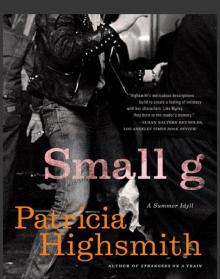 Small G: A Summer Idyll
Small G: A Summer Idyll The Boy Who Followed Ripley
The Boy Who Followed Ripley Edith's Diary
Edith's Diary Ripley's Game
Ripley's Game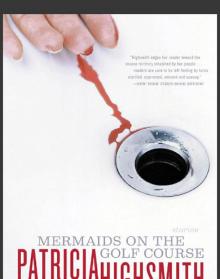 Mermaids on the Golf Course: Stories
Mermaids on the Golf Course: Stories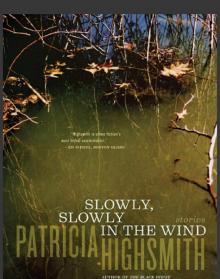 Slowly, Slowly in the Wind
Slowly, Slowly in the Wind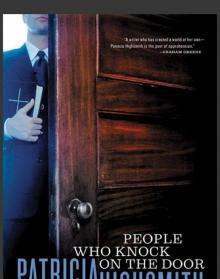 People Who Knock on the Door
People Who Knock on the Door The Glass Cell
The Glass Cell The Blunderer
The Blunderer Those Who Walk Away
Those Who Walk Away A Suspension of Mercy
A Suspension of Mercy Eleven
Eleven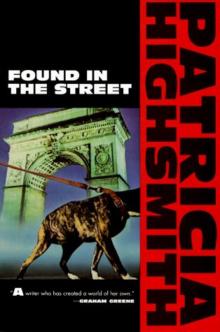 Found in the Street
Found in the Street Ripley Under Ground
Ripley Under Ground The Black House
The Black House The Cry of the Owl
The Cry of the Owl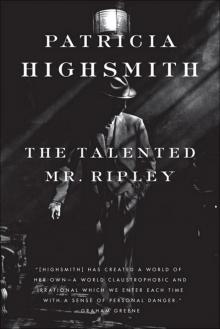 The Talented Mr. Ripley
The Talented Mr. Ripley This Sweet Sickness
This Sweet Sickness The Two Faces of January
The Two Faces of January The Animal-Lover's Book of Beastly Murder
The Animal-Lover's Book of Beastly Murder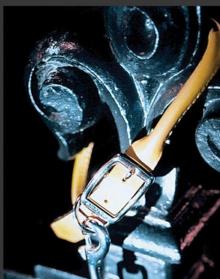 A Dog's Ransom
A Dog's Ransom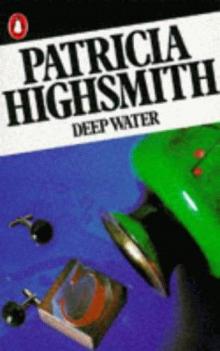 Deep Water
Deep Water Strangers on a Train
Strangers on a Train Ripley Under Water
Ripley Under Water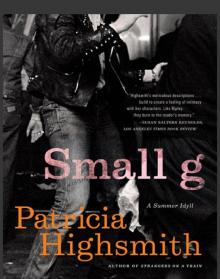 Small g
Small g Nothing That Meets the Eye
Nothing That Meets the Eye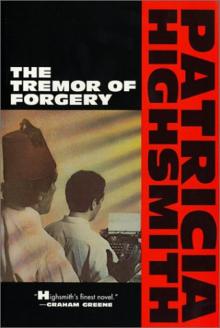 Patricia Highsmith - The Tremor of Forgery
Patricia Highsmith - The Tremor of Forgery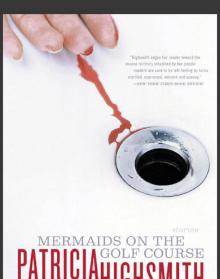 Mermaids on the Golf Course
Mermaids on the Golf Course Suspension of Mercy
Suspension of Mercy The Price of Salt, or Carol
The Price of Salt, or Carol Glass Cell
Glass Cell